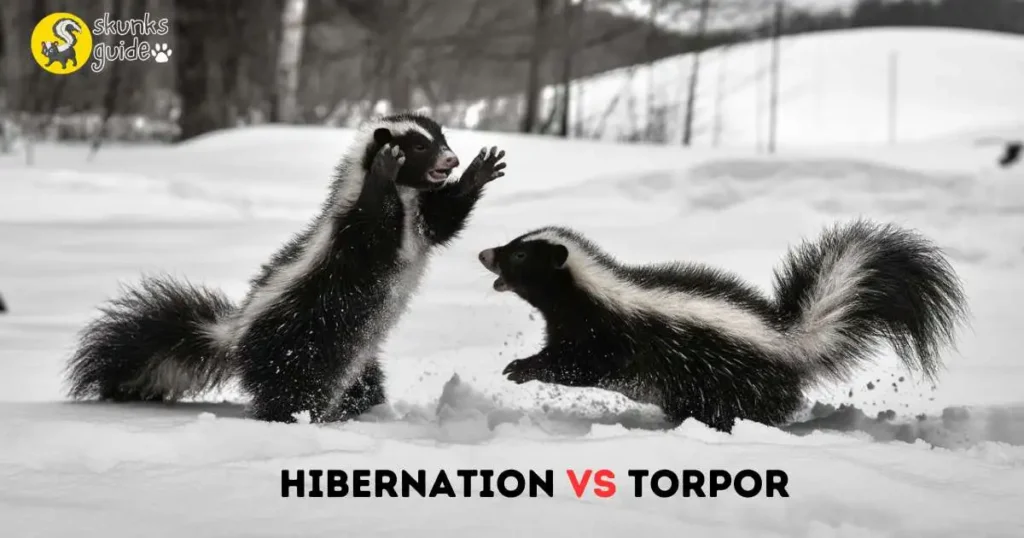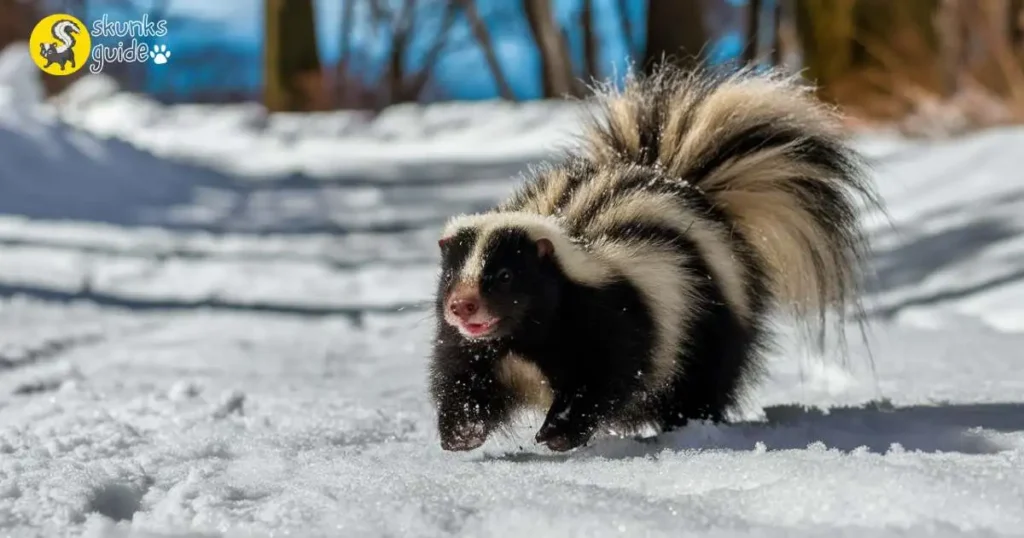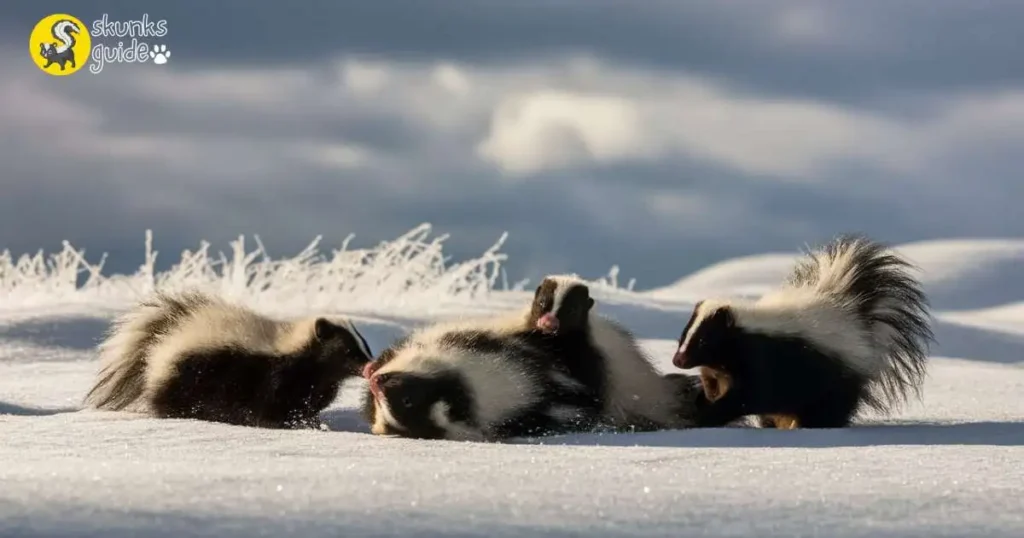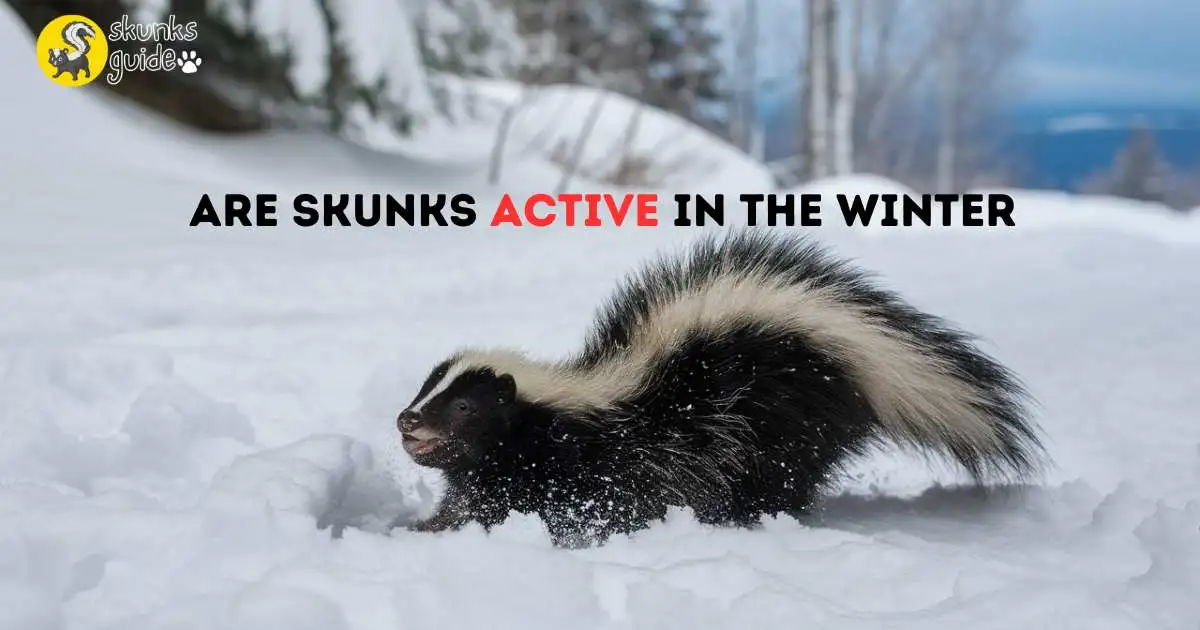Are Skunks Active in the Winter
Not much! Skunks enter a state of torpor, where they rest and move around a lot less. Through my research as a wildlife expert, I’ve found out some surprising details about how skunks manage the cold. If you’ve ever wondered what skunks do when it’s freezing outside, keep reading—you’ll find out how they survive the winter!
Skunks’ Winter Habits
Skunks have unique behaviors during winter months. They adapt to cold weather. Understanding these habits helps people appreciate skunks more.
Entering Torpor
Skunks do not hibernate like bears. They enter a state called torpor. This means they sleep a lot but can wake up easily.
- Torpor helps skunks conserve energy.
- They lower their body temperature.
- Heart rate slows down significantly.
During torpor, skunks may sleep for days. They wake up to eat if needed. This state lasts until warmer weather returns.
Searching For Food
Even in winter, skunks look for food. They dig through snow for insects and plants. They are opportunistic eaters.
| Food Sources | Season Availability |
|---|---|
| Insects | Available under snow |
| Fruits | Limited in winter |
| Small mammals | Active, but harder to find |
Skunks may also visit bird feeders. They enjoy seeds and scraps left behind. This helps them survive during cold months.
Hibernation Vs Torpor

Understanding how skunks behave in winter involves knowing hibernation and torpor. Both are survival strategies but differ significantly. Hibernation lasts for months. Torpor is short-term, often overnight or for days. Skunks do not hibernate like true hibernators. They enter a state similar to torpor during winter.
Characteristics Of True Hibernators
True hibernators have specific traits. Here are some key characteristics:
- Extended Sleep: They sleep for months.
- Body Temperature Drop: Their body temperature lowers significantly.
- Metabolic Rate: Their metabolism slows down drastically.
- Fat Reserves: They rely on stored fat for energy.
- Limited Activity: They rarely wake up during winter.
| Characteristic | True Hibernators | Skunks |
|---|---|---|
| Duration of Sleep | Months | Days to weeks |
| Body Temperature | Significantly lowered | Remains relatively stable |
| Metabolic Rate | Greatly reduced | Only slightly reduced |
| Energy Source | Stored fat | Occasional foraging |
How Skunks Differ
Skunks do not fully hibernate. Their behavior varies in winter.
- Active Periods: Skunks may wake and forage.
- Location: They find shelter in burrows or dens.
- Temperature Regulation: They maintain a stable body temperature.
- Social Behavior: They may stay with others for warmth.
Understanding these differences helps us appreciate skunks’ unique adaptations. They survive winter without true hibernation.
Behavioral Adaptations
Skunks exhibit interesting behavioral adaptations during winter. These changes help them survive harsh conditions. Understanding these adaptations reveals how skunks cope with the cold.
Finding Shelter
Skunks seek out safe, warm places to hide during winter. They look for natural shelters like:
- Burrows
- Rock crevices
- Under fallen trees
- Abandoned animal dens
These shelters provide protection from cold winds and predators. Skunks may also dig their own burrows. They often huddle together for warmth, maximizing heat retention.
Social Dynamics During Cold Months
Skunks change their social behavior in winter. They tend to become less active and more solitary. Some key points include:
- Reduced mating activity
- Minimal social interactions
- Focus on finding food
Skunks may gather in small groups for warmth. This behavior helps them share body heat. They remain alert to threats, even in groups.
Understanding these social dynamics shows how skunks adapt. They balance their need for warmth with the instinct to be cautious.
Dietary Changes
Skunks experience notable dietary changes during winter months. As temperatures drop, food becomes scarce. Skunks must adapt their eating habits to survive.

Shifts In Food Sources
In winter, skunks primarily shift their food sources. They rely more on stored food. Here are some common food sources for skunks in winter:
- Roots and tubers
- Insects and larvae
- Seeds and nuts
- Small mammals
Skunks may dig underground for roots. They also scavenge leftovers from other animals. This helps them find enough nutrients.
Impact Of Scarce Resources
Scarcity of food impacts skunks significantly. They may travel longer distances in search of food. This increases their risk of encounters with predators.
During harsh winters, skunks can experience:
- Weight loss
- Weakness
- Lower reproduction rates
These factors affect their survival and overall health. Understanding these dietary changes helps in wildlife management.
Activity Patterns
Understanding skunk activity patterns helps us know their behavior in winter. Skunks adapt to cold weather in unique ways. They adjust their daily routines based on various factors.
Daytime Vs. Nighttime Activity
Skunks are primarily nocturnal animals. They are more active at night. During the day, they often rest in their dens. Here’s a quick look at their activity:
| Time of Day | Activity Level |
|---|---|
| Daytime | Low (sleeping in dens) |
| Nighttime | High (foraging for food) |
Skunks venture out at night to search for food. Their diet includes insects, fruits, and small rodents. They rely on their keen sense of smell to find meals.
Weather Influence On Movement
- Cold Snap: Skunks may hibernate or become less active.
- Snow: Heavy snow can restrict their foraging.
- Mild Days: Skunks may become more active during warmer spells.
In winter, skunks may reduce their food intake. They may also stay in their dens for longer periods. Understanding these patterns helps us appreciate their survival skills
Reproduction And Winter
Skunks have interesting reproductive behaviors, even in winter. Mating season occurs during this chilly time. They prepare for their young while managing winter challenges. Understanding their reproductive cycle helps us appreciate these unique creatures.

Mating Season Timing
Skunk mating season typically begins in late winter. Here are some key points:
- February to March: Most skunks mate during this time.
- Delayed implantation: Fertilized eggs do not implant immediately.
- Gestation period: Lasts about 60 to 75 days.
Skunks mate in various locations. They prefer secluded areas to avoid predators.
Preparations For Offspring
As spring approaches, skunks prepare for their young. Here’s how they get ready:
- Nesting: Skunks find safe, hidden spots.
- Gathering materials: They collect grass, leaves, and fur.
- Increasing food intake: They eat more to support pregnancy.
Mother skunks will raise their young in a den. The den provides warmth and protection.
Human And Skunk Encounters
Human and skunk encounters can happen anytime. These interactions often raise concerns. Understanding skunk behavior helps in managing these encounters.
Reduced Risk In Winter
Skunks tend to be less active during winter months. They enter a state called torpor. This process conserves energy and reduces food needs. Here are some reasons why winter encounters are rare:
- Skunks hibernate or stay in dens.
- Food sources are limited.
- Cold weather discourages outdoor activity.
During winter, skunks avoid human contact. Most people won’t see them roaming around. This reduces the chances of unexpected encounters.
Safety Measures For Homeowners
Homeowners can take steps to minimize skunk visits. Following these safety measures will keep your property skunk-free:
- Seal all entry points around your home.
- Store trash in secure containers.
- Remove pet food after feeding.
- Keep gardens tidy and free of fallen fruit.
Implementing these measures helps maintain safety. Always be cautious if you spot a skunk. Remember, skunks can spray when threatened.
Conservation And Protection
Skunks play a vital role in the ecosystem. They help control insect and rodent populations. Protecting skunks ensures a balanced environment. Understanding their challenges, especially in winter, is crucial for their survival.
Threats During The Colder Months
Winter brings unique challenges for skunks. Here are some major threats:
- Food Scarcity: Snow covers their food sources. Insects and fruits become hard to find.
- Harsh Weather: Extreme cold can be deadly. Skunks need shelter from freezing temperatures.
- Predators: Other animals hunt skunks more easily in winter. Their movement becomes limited.
- Human Activities: Urban development reduces their habitat. Roads and buildings can isolate skunk populations.
| Threat | Impact on Skunks |
|---|---|
| Food Scarcity | Malnutrition and starvation |
| Harsh Weather | Increased mortality rates |
| Predators | Higher risk of being hunted |
| Human Activities | Loss of habitat and isolation |
How To Help Skunks Survive The Winter
Everyone can contribute to skunk conservation. Here are simple ways to help:
- Create Shelter: Build small shelters using wood or old boxes.
- Provide Food: Leave out fruits and nuts. Avoid processed foods.
- Maintain Natural Habitats: Support local conservation efforts.
- Reduce Pesticide Use: Less chemicals mean more food for skunks.
- Educate Others: Share knowledge about skunk protection.
Helping skunks during winter benefits the entire ecosystem. Every action counts in conservation.
Frequently Asked Questions
Do Skunks Still Come Out In The Winter?
Skunks typically enter a state of dormancy in winter. They may emerge on warmer days to forage but generally stay in their dens. Their activity decreases significantly during cold months, as they conserve energy and avoid harsh conditions. Winter is not their peak activity season.
What Time Of Year Do Skunks Go Away?
Skunks typically become less active in late fall and winter. They may hibernate or seek shelter during colder months. As temperatures rise in spring, skunks reemerge. Adjustments in their activity depend on local climate and food availability.
Do Skunks Come Out Of Their Den Every Night?
Skunks typically emerge from their dens at night. They are nocturnal animals, preferring to forage for food after dark. Their activity increases during warmer months, while they may stay in their dens during colder weather. This behavior helps them avoid predators and seek out food sources effectively.
Conclusion
Skunks do exhibit some activity during winter, but it’s often reduced. They may enter a state of torpor, conserving energy. Understanding their behavior can help prevent unwanted encounters. If you live in an area with skunks, take precautions to minimize attraction.
Awareness is key to coexisting peacefully with these fascinating creatures.

